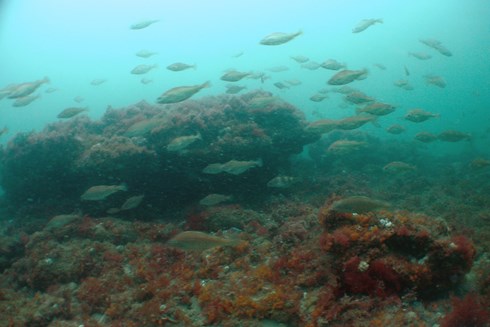Sussex inshore waters are now better protected for generations to come thanks to new progressive management of trawling – a move which is supported by Greater Brighton and forms part of its GB10 initiative.
The Sussex Inshore Fisheries and Conservation Authority’s new Nearshore Trawling Byelaw has been approved by the Secretary of State for the Department for Environment, Food & Rural Affairs, the Rt. Hon. George Eustice.
Trawling is now prohibited throughout the year over large areas along the entire Sussex coast closest to the shore. The new measures allow essential habitats, such as kelp forests, to regenerate.
The new fisheries management measures are specifically intended to help safeguard the habitats that will ensure sustainable inshore fisheries into the future. Those areas protected include a large area extending 4km seaward between Shoreham-by-Sea and Selsey Bill.
Historically, until the late 1980’s this area held extensive, dense kelp beds that supported abundant marine life, including important commercial fish and shellfish species such as bass, sole, black seabream, lobsters and cuttlefish.
The kelp is now largely absent, so the ecology of the area is significantly diminished compared with the recent past. The new trawling restrictions will also encompass the Marine Conservation Zone known as ‘Selsey Bill & the Hounds’.
The Authority’s new measures reflect an ecosystem approach toward fisheries management, recognising the importance of healthy marine habitats in supporting long term healthy commercial and recreational fisheries.
In addition to the fisheries benefits that recovering kelp provides, coastal kelp beds help combat climate change by removing carbon dioxide from the atmosphere (carbon sequestration), reduce coastal erosion by absorbing wave energy and provide a haven for wildlife.
Sussex IFCA will be working with our partners and the community to raise awareness of the importance of marine habitat protection and its links to sustainable fisheries.
Tim Dapling, Chief Fisheries & Conservation Officer for the Authority, explains: “The Authority has spent several years carefully working toward the introduction of this important new management measure. There has been great interest and support within Sussex and the wider marine community regarding our work to both protect the marine environment and promote sustainable commercial and recreational fisheries. This is a key step toward more sustainable fisheries and delivery of positive outcomes for all. Future work will include assessing habitat recovery, biological productivity and benefits to the inshore fishing community.”
Deputy Chief Fisheries & Conservation Officer for the Authority, Dr Sean Ashworth said: “We are delighted that the local community and central government have recognised the critical importance of looking after Sussex marine wildlife and the local fisheries that critically depend upon it. We look forward to seeing a regeneration of the lost kelp forests and an associated improvement of the inshore fishery. The result is a testament to local management involving all stakeholders.”
For more details visit: www.sussex-ifca.gov.uk.

